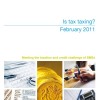ACE has produced a new paper looking into some of the administrative and cost issues that SMEs face when dealing with the tax system.
The paper raises a number of ways that the system might be simplified for the benefit of small firms. It recommends;
The government should combine PAYE and NIC. This will reduce the size and cost of administering these taxes to all businesses.
The government should raise the VAT threshold because the level of administrative burden changes significantly once companies pass this point. Raising the threshold would ensure that a company had enough resource to deal with the burden imposed by VAT.
Government should look to simplify the definitional aspects of the tax system. This would make the calculation and understanding of the system much simpler for companies.
Considerations need to be made for SMEs. Currently, tax rules are targeted more towards the larger and multinational companies.
Reduce corporation tax for small businesses.
The tax system should recognise that the level of tax burden changes significantly across small to medium enterprises.
Initiatives such as the Business Payment Support Service should be extended, as these help SMEs by allowing businesses facing financial difficulties to spread tax payments over a timetable they can afford. Cash flows for small businesses that employ fewer than ten people would often prefer a range of payment options that remove the need for paying lump sums.
Providing certainty within the tax system is key to business with regards to assessing their liabilities and future investment potential. Tax reforms should be published as part of a larger roadmap outlining key steps and actions that will take place over the next 15 year period.
Government should further explore the possibility of underwriting SME overdraft facilities. This would help to address some of the cash flow issues experienced by SMEs without the need for radical tax reform. Criteria could be put in place in relation to the percentage available based upon a business‟ current credit conditions, turnover, staffing, and spending patterns.
Flexibility support on VAT introduced during the recession should be a permanent feature of the tax system.
Company website:
http://www.acenet.co.uk/



